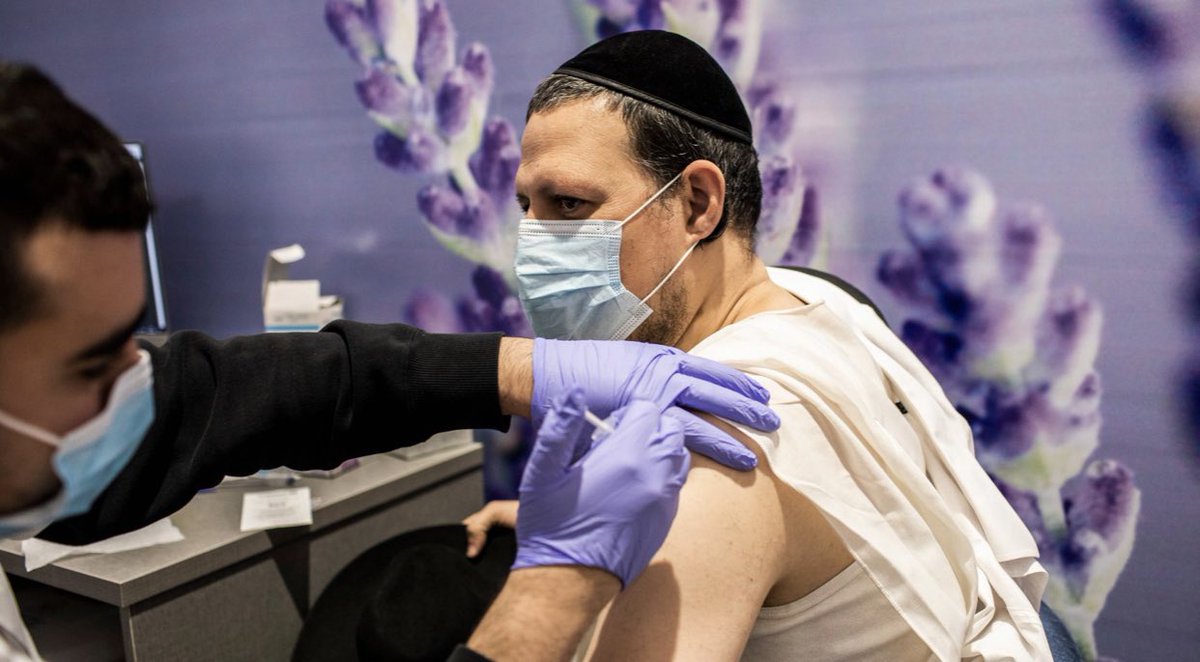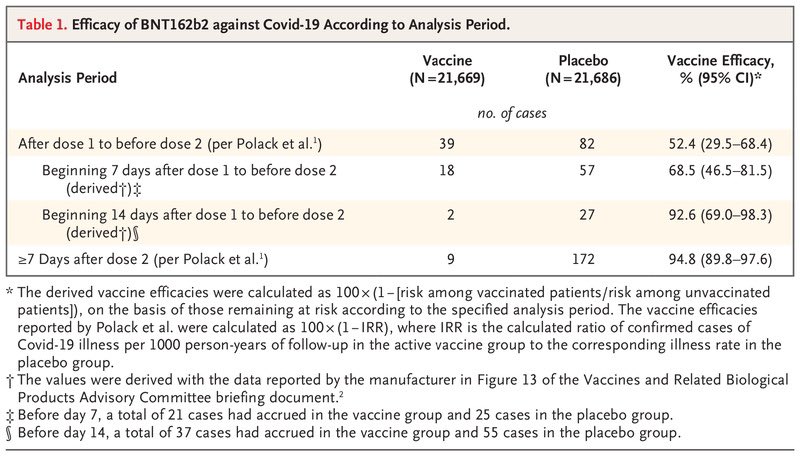BREAKING—new #COVID19 vaccine efficacy study from Israel concludes that Pfizer/BioNTech's jab is up to 85% effective after the first dose after 15 days to day 28—and even 75% including asymptomatic cases—meaning it stops infections by 75%! Huge. 
https://news.sky.com/story/covid-19-pfizer-vaccine-is-up-to-85-effective-after-first-dose-new-israeli-study-finds-12222164

https://news.sky.com/story/covid-19-pfizer-vaccine-is-up-to-85-effective-after-first-dose-new-israeli-study-finds-12222164
2) The research, conducted by the Sheba Medical Centre, the country's largest hospital, has been published in the Lancet medical journal.
The hospital assessed the effectiveness of the first dose of the Pfizer/BioNTech vaccine among 7,000 of its healthcare employees.
The hospital assessed the effectiveness of the first dose of the Pfizer/BioNTech vaccine among 7,000 of its healthcare employees.
3) Professor Eyal Leshem, an infectious disease expert and director of Sheba's Institute for Travel and Tropical Medicine, told Sky News: "This is first real-world evidence of effectiveness that shows up after the first dose of the vaccine.” 

4) “We had some hints from the clinical trials and some calculations that were made based on the clinical trial [but] this shows early effectiveness, even before the second dose was administered."
5) “It] is very specific - a closed group of persons - with very easy access to healthcare and to testing - these are healthcare workers.
"So the minute they get either exposed or have the mildest of symptoms, they went ahead and got tested”. (Thereby capturing more cases)
"So the minute they get either exposed or have the mildest of symptoms, they went ahead and got tested”. (Thereby capturing more cases)
6) “Professor Leshem said he likes more cautious statements, but added: "I would say there is some evidence to support the decision to postpone the second dose, because, on one hand, we seem to have very good effectiveness of the first dose: early and high effectiveness.
7) “"And on the other hand, postponing the second dose will allow much higher coverage... given the limited vaccine supply."
8) “The Israeli data looked at efficacy up to four weeks after the first dose. The study doesn't give any evidence-based indication that the efficacy holds up for 12 weeks. However, Professor Leshem said it's a fair assumption that efficacy would be maintained beyond four weeks.”
9) Meanwhile, Pfizer vaccine had an efficacy of 92.6% after the first dose, based on an analysis of the documents submitted by the drugmaker to the U.S. Food and Drug Administration (FDA). https://mobile.reuters.com/article/amp/idUSKBN2AI0EC?__twitter_impression=true
10) These findings were similar to the first-dose efficacy of 92.1% reported for Moderna Inc's mRNA-1273 vaccine, according to the letter on Wednesday. https://www.nejm.org/doi/full/10.1056/NEJMc2036242
11) Why did some say it was 52% for first dose? Well they didn’t exclude the first 14 days when immune system still learning the vaccine-presented spike protein and building immunity. If you exclude first 14 day, then efficacy is low 90s% for days 14 to before dose 2.
12) Thus the authors argue: “With such a highly protective first dose, the benefits derived from a scarce supply of vaccine could be maximized by deferring second doses until all priority group members are offered at least one dose.
13) “the administration of a second dose within 1 month after 1st, provides little added benefit in the short term, while high-risk persons who could have received a first dose with that vaccine supply are left completely unprotected.
14 “Given the current vaccine shortage, postponement of the second dose is a matter of national security that, if ignored, will certainly result in thousands of Covid-19 hospitalizations & deaths that would have been prevented with a first dose of vaccine.”

 Read on Twitter
Read on Twitter



